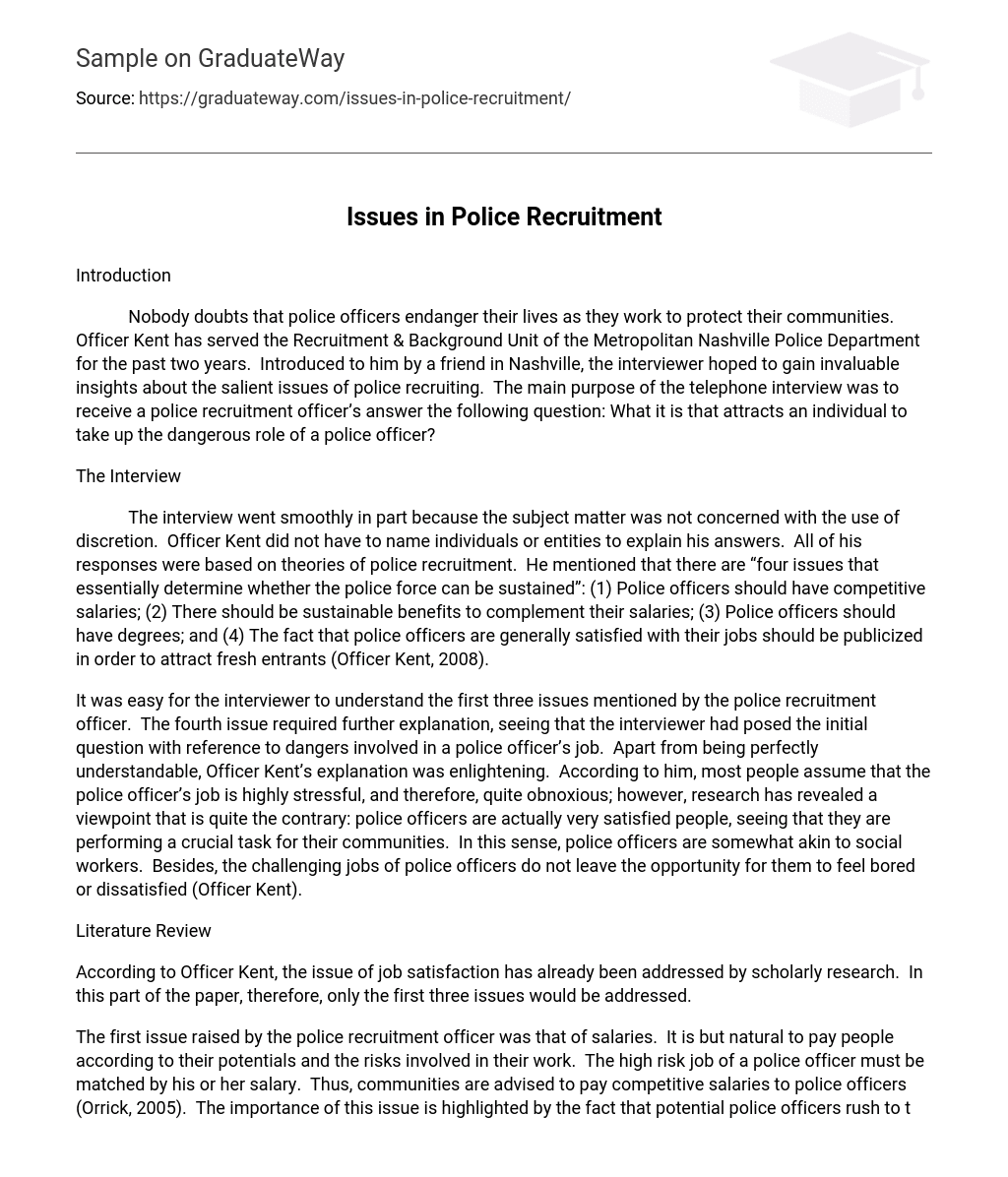Introduction
Nobody doubts that police officers endanger their lives as they work to protect their communities. Officer Kent has served the Recruitment & Background Unit of the Metropolitan Nashville Police Department for the past two years. Introduced to him by a friend in Nashville, the interviewer hoped to gain invaluable insights about the salient issues of police recruiting. The main purpose of the telephone interview was to receive a police recruitment officer’s answer the following question: What it is that attracts an individual to take up the dangerous role of a police officer?
The Interview
The interview went smoothly in part because the subject matter was not concerned with the use of discretion. Officer Kent did not have to name individuals or entities to explain his answers. All of his responses were based on theories of police recruitment. He mentioned that there are “four issues that essentially determine whether the police force can be sustained”: (1) Police officers should have competitive salaries; (2) There should be sustainable benefits to complement their salaries; (3) Police officers should have degrees; and (4) The fact that police officers are generally satisfied with their jobs should be publicized in order to attract fresh entrants (Officer Kent, 2008).
It was easy for the interviewer to understand the first three issues mentioned by the police recruitment officer. The fourth issue required further explanation, seeing that the interviewer had posed the initial question with reference to dangers involved in a police officer’s job. Apart from being perfectly understandable, Officer Kent’s explanation was enlightening. According to him, most people assume that the police officer’s job is highly stressful, and therefore, quite obnoxious; however, research has revealed a viewpoint that is quite the contrary: police officers are actually very satisfied people, seeing that they are performing a crucial task for their communities. In this sense, police officers are somewhat akin to social workers. Besides, the challenging jobs of police officers do not leave the opportunity for them to feel bored or dissatisfied (Officer Kent).
Literature Review
According to Officer Kent, the issue of job satisfaction has already been addressed by scholarly research. In this part of the paper, therefore, only the first three issues would be addressed.
The first issue raised by the police recruitment officer was that of salaries. It is but natural to pay people according to their potentials and the risks involved in their work. The high risk job of a police officer must be matched by his or her salary. Thus, communities are advised to pay competitive salaries to police officers (Orrick, 2005). The importance of this issue is highlighted by the fact that potential police officers rush to take the entrance exam for the Suffolk County Police Department, which pays a salary that is “more than double that of the nearby NYPD (Eltman, 2007).” Although all examinees have to pay $100 as entrance fee, it is a small price to pay for a financially secure future (Eltman).
The issue of benefits is also supported by research. The benefits that police departments offer to their officers should be complements to the basic salary on offer; for example, salaries “with cost of living adjustments, longevity, and advanced certifications” and “career development programs” to help the police officers grow in their profession (Orrick). Benefits may also include holiday entitlements, reduced premiums on various insurances, and “free travel on public transport (“Benefits,” 2007).”
As for the third issue in police recruitment mentioned by Officer Kent, research has revealed that there are fewer people interested in joining the police force today because more people are choosing to pursue higher degrees instead (Woska, 2006). What is more, police departments that expect new entrants to be college graduates as a bare minimum are expected to meet with success in their recruiting efforts (“The Chief’s,” 2006).
Conclusion
The most interesting detail gathered through the interview was the fact of essential job satisfaction in the police force. Because the job of a police officer is definitely dangerous, Officer Kent stated that the police force must be “sustained” by addressing four issues in police recruitment: salary, benefits, education, and job satisfaction (Officer Kent). The issue of job satisfaction calls for further interviews with police practitioners, however. Although Officer Kent’s explanation was comprehendible, the interviewer feels inclined to gather more information about job satisfaction from police officers that actually move around towns and cities to protect citizens from crime.
Knowing that satisfaction is inherent to the job of a police officer has changed the interviewer’s opinion about how danger is perceived by police officers. Job satisfaction in the police force is a welcomed thought, indeed. Because the main purpose of the interview was to explore police officers’ perception of danger – the fourth issue mentioned by Officer Kent especially made this assignment a highly enlightening process. No doubt, it has changed the interviewer’s view of policing.
References
Benefits of Being a Police Constable. (2007). West Midlands Police Recruitment. Retrieved Oct
29, 2008, from http://www.west-midlands.police.uk/wmprrecruit/po_benefits.asp.
Eltman, F. (2007, Jun 8). High salaries draw 29,300 to police exam. Yahoo! News. Retrieved Oct
29, 2008, from http://news.yahoo.com/s/ap/20070608/ap_on_re_us/police_recruiting.
Officer Kent. (2008, Oct 27). Telephone Interview.
Orrick, D. (2005, Sep). Police Turnover. The Police Chief, vol. 72, no. 9.
The Chief’s Perspective: Demolishing the Recruitment Myth. (2006, Aug). The Police Chief,
vol. 73, no. 8.
Woska, W. J. (2006, Oct). Police Officer Recruitment: A Public-Sector Crisis. The Police Chief,
vol. 73, no. 10.





